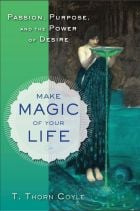Desire. Taste that word. Roll it around on your tongue. Feel it in your belly, your sex, the crown of your head. What does it smell like? What sound does it make? How deeply are you willing to let yourself experience it?
What does it smell like? What sound does it make? How deeply are you willing to let yourself experience it?
I love the word desire: for me, it conjures up images of watermelon juice running down my chin in the hot summer sun, the full-body relaxation of a baby who is soothed by being picked up, the delicious tang of anticipating pleasure. In her new book, Thorn Coyle defines it as “a driving force, an abiding wish, deep well, a guiding light, a burning fire.” And, she says:
“We court desire by choosing to do so. Whether it feels elusive or strong, we can find and follow the threat that binds our hearts to desire. Sit with it at your altar. Take desire out dancing. Listen more carefully to what your soul wants and needs, knowing that, in doing so, you court not only your personal desire but the desire your soul has for the Mystery that first divided itself for love.”
Thorn Coyle, Make Magic of Your Life: Passion, Purpose, and the Power of Desire
Desire is the root of what sustains practice. You can practice because you think you should or because someone tells you to, and these can be useful motivations for a while, but in the end, they’re like a cup of coffee when what you really need is a good night’s sleep. To sustain practice, we must find ones that in turn sustain us. That sustenance is going to be rooted in desire for something, whether it’s wholeness, connection, quiet, or delight.
One of the strengths of this book, however, is its clarity about the inevitability of obstacles, even when you are doing everything right. You can practice every day, eat your greens, take your vitamins, pay all your bills on time, and still have obstacles. While this is tremendously disappointing to the parts of us that are reaching for safety by trying to feel in control, if we can make space for this truth, it can also show us a way out of perfectionism and self-negation.
“Sometimes the very obstacles themselves are a sign to me that, instead of ‘go, go, go; rah, rah, rah,’ what may be more helpful is a change in perspective. … [S]inking into patience and opening our field to something new is not the same as resignation. It is active, aware listening.”
Finding the discernment to tread the path between these two ideas — to stretch to know and court desire, and to allow ourselves to not know and release our attachment to outcome — is the work of a lifetime, and practice is part of how we do that work.
What is the abiding wish behind your practice? I’d love to hear about it.
Watch an author video with T. Thorn Coyle and read more responses to Make Magic of Your Life at the Patheos Book Club!












